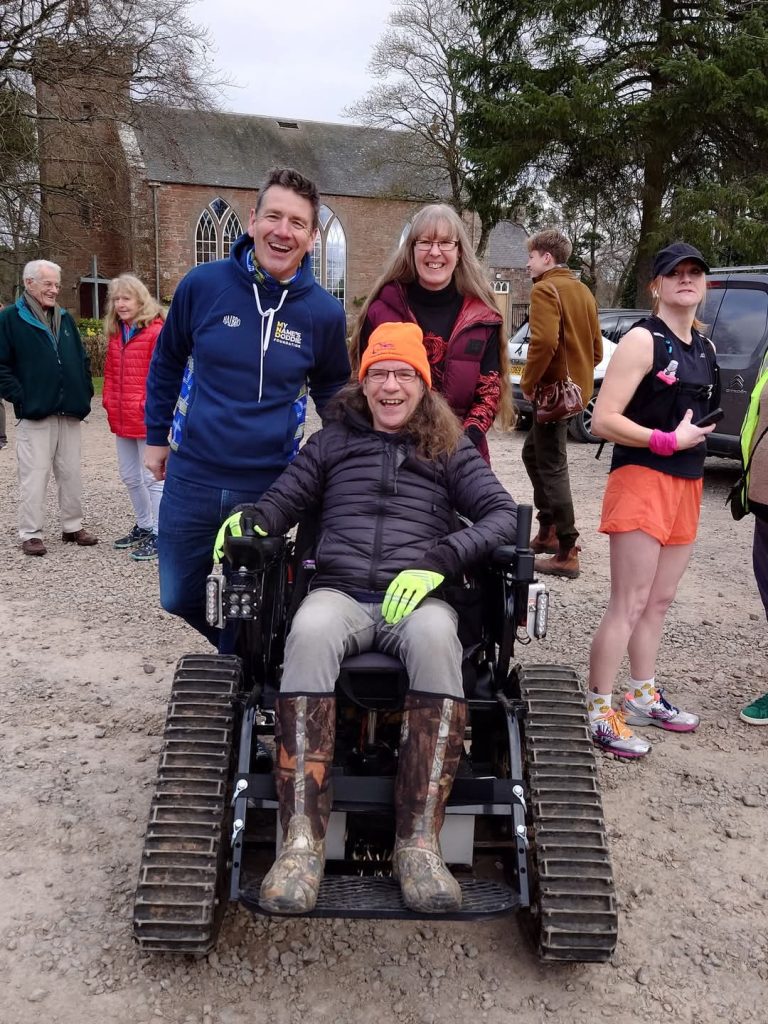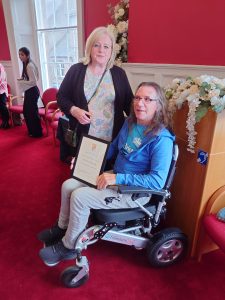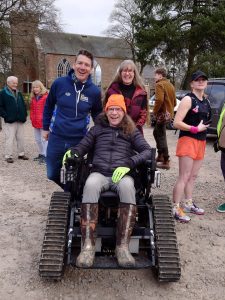What is MND
Find support
I have MND
I am supporting someone
Get involved
Research
About MND Scotland

There are around 450 people currently living with motor neuron disease (MND) and almost 200 people are diagnosed each year in Scotland. Alan said: “It’s very difficult for people to grasp how variable MND is, so I’ve made my own saying that seems to work: ‘nobody can tell you what’s next, and nobody can tell you when next is’.”
Alan Budge, fondly known as ‘Budgie’ to his friends and family, grew up in Edzell – a village in Angus, Scotland, five miles north of Brechin. Alan, 62, and his partner, Marian, have been together for seventeen years and got married earlier this year. They live with son, Morgan, 21.
Following a series of tests from April 2024, Alan was diagnosed with MND on 20 November of the same year. He worked as a machine operator at the time and had to stop working due to the impact the disease was having on him.
Alan said: “I was already doing light duties four months before I was diagnosed. Even though I enjoyed it, a working day was getting too exhausting. For example, if I was kneeling on the ground, I had to ‘sofa surf’ on any surface just so I could to get back up vertically”.
Motor neuron disease (MND) is the general name given to a group of illnesses which affect nerves called motor neurons in the brain and spinal cord.
In a healthy person, the motor neurons carry signals from the brain directly to the muscles. But if you’re living with MND, the disease can prevent these signals from reaching your muscles.
Over time, this can lead to muscles becoming weaker and weaker until they stop working. This can affect the way your body works.
In 2020, Alan was involved in a serious accident which significantly damaged his spine.
After experiencing several symptoms at the beginning of 2024, Alan spoke to his GP: “I was wearing steel toe cap boots at work on a hard surface, and I could hear my left foot slapping down
“I was given some exercises from a private physiotherapist, but within ten days I couldn’t do them let alone progress with them. I went to the NHS and I was seen very quickly by the Head Physiotherapist for the area. I didn’t have foot drop because I could hold my foot level. She said it was very unusual to be short of one movement”.
Foot drop (drop foot) is where it’s difficult to lift or move your foot and toes. It usually affects one foot and can affect the way you walk.
It took about six months for Alan to be diagnosed with MND: “My friend who’s a retired consultant guided me through the entire process and was very impressed with how quickly I received my diagnosis. There were a few “red herrings” along the way. The first issue was related to my limited movement, which was linked to a possible impinged nerve from my accident in 2020. However, my GP was already working with a physiotherapist regarding the MRI and rheumatology, as they had identified that my creatine kinase (CK) levels were very high, indicating muscle wastage.
“It was agreed that, before I got the MRI and if the results were clear, I would be referred urgently to rheumatology. The MRI came back clear, and within ten days, I was at the rheumatologist’s office. She correctly identified that the elevated CK levels were a red herring.
“At the same time, she referred me to neurology for a nerve conduction test. That’s when things started to make sense for me and when I realised that what I’ve got, isn’t going to be good. I was then given the option of going into hospital for four days for intensive testing and that led to the diagnosis”.
Speaking about his awareness of MND before being diagnosed, Alan said: “I did my own research to look at what the possibilities might be. My consultant indicated that whatever it was, it wasn’t going to have a good outcome, so I prepared for the worst and hoped for the best.
“I was aware of MND as we built a house specifically for a man in the area when I was a site manager about eight years ago. We incorporated features like a walk-in shower, and at the time, he could still drive, so we made the garage floor the same height as the utility room to allow for easy access with his wheelchair into the car. So, while I wouldn’t say I was hugely knowledgeable, I had some awareness”.
Motor neuron disease (MND) is a rapidly progressing terminal neurological illness, which stops signals from the brain reaching the muscles. This causes muscle weakness and wasting. MND can rob someone of the ability to walk, talk, swallow and breathe.
In addition to changing their routine, Alan and his wife Marian have made several adaptions to their home to help make things a bit easier, including rearranging the house, installing a wider front door, and they are waiting on authorisation to install a wet room to help with Alan’s future needs.
Speaking about the impact MND has had on him, Alan said: “Marian and I agreed shortly after my diagnosis that we would take each day as it comes.
“I have mobility issues, specifically with walking. My condition has been gradually deteriorating, but by the time I was diagnosed in November, I was already walking very awkwardly. Upon reflection, I realise that the decline hasn’t been rapid, it has been a constant issue. I’ve not had use of my toes for several months.
“Rather than viewing it all as one big jump, things can change week by week, day by day. For example, while I was showering earlier, my wife mentioned that she was going to get something to eat. I asked her if she could please put the cereal, bowl, and spoon on the table for me as it’s difficult for me to reach up in the cupboard for the bowl and lean down to get the cereal.
“By just putting everything on the table, I can easily pour the cereal into the bowl, add the milk, and eat it. It’s not the eating part that’s challenging for me; it’s the physical effort of getting everything ready. This is just one example of how we’ve adapted to make things easier and overcome the norm.”

Since being diagnosed with MND, Alan and Marion have accessed support from MND Scotland: “We received financial support and advice and were able to access grants. MND Scotland was also able to help with advocacy support by helping me to set up power of attorney.
“I also received help from MND Scotland’s Director of Research, Dr Jane Haley MBE. I was taking part in a fundraising challenge at the time and needed to come up with a fact about MND each day over the course of the month. Jane was able to help with fact-checking to ensure the information was correct”.

Alan is heavily involved in his local community and a member of Brecon Rd Runners Club, and Montevallo and Stonehaven Cycling Clubs. Members from the clubs were there on the day to show their support in addition to members of the local community.
MND Scotland would like to thank Alan for sharing his story and for helping to raise awareness about motor neuron disease.
For more information about MND Scotland or how we can support you or your family, please visit: www.mndscotland.org.uk, email: support@mndscotland.org.uk, or call: 0141 332 3903.
Sign up
for newsletter
Get the latest news and events straight to your inbox.
You can help create a world without MND